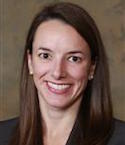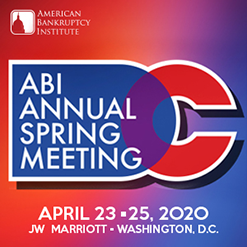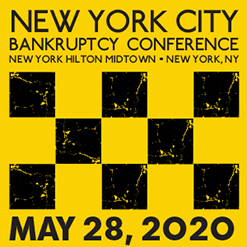| |
| |
| vol 18, num 1 | MARCH 2020 |
| |
|
|
| |
|
|
|
|
|
| |
| Ethics and Professional Compensation Committee Annual Report |
| The Ethics and Professional Compensation Committee had a busy and productive 2019. As evidenced by our steadily increasing membership, the committee is a valuable resource for insolvency professionals interested in keeping abreast of current and important issues involving ethics and professional compensation in the bankruptcy field. These are some of the highlights from this year:
Newsletters
The committee published three newsletters in 2019 with a combined 12 articles, each discussing various and current issues in ethics or compensation. View Committee Posts.
Educational Programs
At the Annual Spring Meeting, our committee paired with the with Asset Sales Committee and presented “Not so Free, Not so Clear: An Ethical Walk Through Asset Sales,” using hypotheticals to discuss the ethical problems facing counsel and their clients in § 363 sales, including collusion, abuses during due diligence, and successor liability. View Online.
For the Winter Leadership Conference, the committee joined the Consumer Bankruptcy Committee to present “Consumer Attorney Fees: Everything You Always Wanted to Know — the Good, the Bad, and the Ugly,” which examined current issues in consumer representation and compensation. |
| |
|
|
|
|
| |
|
| |
| Order Striking a Charging Lien Reminds Us to Read Ethics Rules Carefully |
| A recent decision by Judge Isicoff is a reminder that both (1) fee agreements in bankruptcy court are governed by state rules of professional responsibility, and (2) attorneys must read those rules carefully when drafting agreements.
In In re Miami Beverly LLC, a creditor of a chapter 11 debtor had been litigating in state court with the debtor before the petition date. After the petition was filed, the creditor’s law firm filed a proof of claim on the creditor’s behalf, as well as a charging lien.
The firm’s contingency-fee agreement with the creditor provided for 50 percent of any recovery in the state court suit. The agreement continued that the firm was entitled to that recovery even if the client terminated the firm and hired new counsel. If new counsel took over, the agreement entitled the firm to a charging lien on 50 percent of any future recovery.
|
| |
|
|
|
|
| |
|
| |
| Brighton Beach Surcharges: Part II |
| This is Part 2 of an article about the Lorick case, concerning the disposition of the proceeds of the bankruptcy sale of a valuable property in Brighton Beach, Brooklyn, in which Wells Fargo was an oversecured creditor. Part 1 of this article laid out the factual background and discussed which expenses the court permitted Wells Fargo to add to its claim.
Surcharges
The U.S. Bankruptcy Code provides that a trustee or debtor in possession “may recover from property securing an allowed secured claim the reasonable, necessary costs and expenses of preserving, or disposing of, such property to the extent of any benefit to the holder of such claim.” Such costs and expenses are referred to as “surcharges.”
According to the court, the Loricks sought to surcharge Wells Fargo for their attorneys’ fees, the receiver’s fees, the receiver’s attorneys’ fees, and various disbursements made by the receiver. The requested surcharges totaled about $1.23 million.
|
| |
|
|
|
|
| |
|
| |
| Trend Allowing Unsecured Claims for Contractual Attorneys’ Fees Continues |
| Earlier this year, the U.S. Court of Appeals for the Fourth Circuit considered whether the Bankruptcy Code bars a creditor from asserting an unsecured claim for attorneys’ fees incurred post-petition but provided for in a pre-petition contract. The Fourth Circuit reversed the lower court’s ruling and joined other federal circuit courts in holding that such claims may be allowed in bankruptcy.
In SummitBridge National Investors III LLC v. Faison, a secured creditor filed an unsecured claim to recover attorneys’ fees that, when added to the secured portion of their claim, exceeded the value of their security interest. The debtor objected and argued that the Bankruptcy Code does not provide for allowance of an unsecured claim for post-petition attorneys’ fees or costs. The U.S. Bankruptcy Court for the Eastern District of North Carolina agreed with the debtor, even though a pre-petition contract between the debtor and creditor specified that the debtor would pay reasonable attorneys’ fees. The U.S. District Court for the Eastern District of North Carolina affirmed the bankruptcy court’s decision on appeal.
Previous Treatment of Claims for Post-Petition Attorneys’ Fees
Courts across the country have long disagreed on whether creditors may assert unsecured claims for post-petition attorneys’ fees arising from pre-petition contracts.
|
| |
|
|
|
|
| |
|
| |
| You Can’t Take It with You, and if You Do, There Will Be Consequences: In-House Counsel that Violated a Noncompete Agreement Denied Discharge Under 11 U.S.C. § 523(a)(6) |
| A recent decision by the U.S. Bankruptcy Court for the District of Utah is a cautionary tale for senior-level employees that are considering leaving their employment and taking employees and business to a competitor. It is also a primer for an employer who has to pursue its claim against the departing employee in bankruptcy court. The wrongdoing employee is not only potentially liable under theories of breach of fiduciary duty, tortious interference and violation of whatever employment agreements are in place, but the offending former employee may also face a discharge objection in bankruptcy court.
After becoming dissatisfied with his employment, in-house counsel to First American Title Insurance Co. took steps to form a new company, including by leasing new space and communicating with First American employees about coming with him to the new company, all of which he concealed from First American. After he resigned from First American, 26 First American employees joined the former in-house attorney at his new company, taking customers with them.
|
| |
|
|
|
|
| |
|
| |
| Carved in Stone: Sixth Circuit Upholds Professional Fee Carve-Out Despite Chapter 7 Conversion |
| In East Coast Miner LLC v. Nixon Peabody LLP (In re Licking River Mining LLC), the Sixth Circuit Court of Appeals recently upheld a bankruptcy court determination (affirmed by the district court) that a carve-out for professionals’ fees in a cash-collateral order was enforceable notwithstanding the conversion of the case from chapter 11 to chapter 7. The decision was based on the express language of the order and prior representations of the lenders’ counsel to the bankruptcy court, as well as what the court considered normal and necessary practice.
The case stemmed from the involuntary bankruptcy of U.S. Coal Corp. and its subsidiaries, including Licking River Mining. The appellants were four lenders to the debtor who held liens on essentially all the debtor’s assets. The lenders had agreed to a cash-collateral order containing a “carve-out” that provided for all allowed fees of estate professionals approved by the bankruptcy court to be paid ahead of the lenders in the event of a conversion to chapter 7. The professionals had been retained to see the debtor’s assets.
After it later became clear that restructuring was no longer an option, the lenders informed the bankruptcy court of their continued support for the debtor’s pursuit of asset sales and affirmed that cash-collateral budgets would be modified to provide for payment of the fees of the professionals working on these sales. Ten days later, the case was converted to chapter 7. Following conversion, the appellees, attorneys and other estate professionals (collectively, the “Professionals”) submitted fee applications seeking compensation totaling $2.5 million, and sought to have those fees paid pursuant to the carve-out, a result that would substantially reduce the collateral available to the secured lenders.
The lenders objected to the payment on the theory that, after conversion, the carve-out funds could not come from the proceeds of pre-petition liens. The objection was overruled by the bankruptcy court, which found that the cash-collateral order and the record made it clear that the carve-out extended to the lenders’ pre-petition liens. This decision was affirmed by the district court.
|
| |
|
|
|
|
| |
|
| |
| ANNUAL SPRING MEETING REGISTRATION IS OPEN |
|
Join the Ethics and Professional Compensation Committee at ABI's Annual Spring Meeting, taking place April 23-25. ASM is one of the biggest insolvency events of the year! Mix professional development and networking at a variety of timely educational sessions, networking events and optional programs — all in the heart of Washington, D.C.
This year, the committee will be pairing with the Emerging Industries and Technology Committee to host a session titled, "Technolgy & Ethics: Protecting Your Sale Process, Your Online Presence - and Your Hide."
Speakers for this session include:
- Dylan Trache (Moderator) - Nelson Mullins Riley & Scarborough LLP; Washington, D.C.
- Prof. Summer Chandler - Concordia University School of Law; Boise, Idaho
- Solymar Castillo-Morales - Goldman Antonetti & Cordova, LLC; San Juan, P.R.
- Prof. Harvey Rishikof - Temple University Beasley School of Law; Philadelphia
|
| |
|
|
|
|
| |
|
|
|
|
|
|
|
|
|
| |












